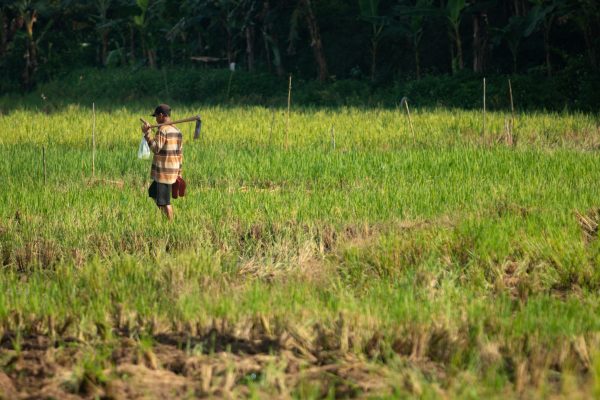ASEAN member states are now prioritising the maintenance of open and operational food supply chains. But it is equally important to address other looming threats to food security. Climate change is already damaging food production as temperatures and precipitation patterns fluctuate. Increasing urbanisation has caused a proportionate decline in the agricultural labour force as the current cohort of farmers age and fewer young people are interested in taking their place.
Given these challenges, agricultural research and development (R&D) must be a core component of any national food security policy. Climate-focussed research is needed to develop crop varieties that are tolerant against a more uncertain climate and extreme weather events.
The incorporation of technology in the agricultural sector will also help optimise production. Technology can range from low-tech techniques, such as surface mulching and building micro-catchments, to advanced innovations including the use of drones and sensors. Modernising the agricultural sector will change the negative perception among young people that the industry is ‘dirty, dangerous and difficult’.
ASEAN member states, though, collectively suffer an agricultural research deficit. In 2020, an International Food Policy Research Institute report highlighted that not only do ASEAN members underinvest in agricultural R&D, but their spending on agricultural R&D as a share of agricultural gross domestic product has steadily declined between 2000–2017. The agricultural sector is also mostly made up of smallholders who cannot invest significantly in R&D.
Currently, ASEAN agricultural R&D efforts are largely confined to knowledge exchanges among member states. But ASEAN remains open to collaborating with external partners to scale up the coordination of member states’ research and policy efforts. ASEAN’s collaboration with Japan in the field of public health surveillance, for example, has been one such success story.
A similar initiative should be implemented to coordinate and strengthen agricultural R&D efforts in Southeast Asia. The European Union is one natural partner. The European Union has vested interests in ASEAN’s food security landscape as Indonesia, Vietnam and Malaysia are key sources of agri-food imports for the European Union.
The European Union would also benefit from using the insights of smallholder farmers in Southeast Asia who collectively form a valuable reserve of knowledge on sustainable practices. Smallholders are capable of producing more output per unit of land than large farms when they apply appropriate farming techniques which reduces the need to expand the land available for agricultural production.
A potential EU–ASEAN initiative could be divided into two proposals. The first proposal is for the European Union to fund and share the technical expertise to establish an ASEAN Centre for Agricultural Research and Development (ACARD). The primary objectives of the ACARD would be to train researchers who specialise in agricultural technology and to help coordinate regional agri-food R&D.
The ACARD should build on existing regional knowledge exchange efforts. It could monitor the status and progress of relevant institutions which contribute to food security and agri-food R&D efforts. This would include working with the ASEAN Food Security Reserve board, the ASEAN Food Security Information System, academic institutions and private research organisations. By positioning itself at the centre of the regional agri-food R&D research network, the ACARD would be equipped to facilitate inter-sectoral R&D coordination, detect potential duplication in research across different institutions and identify gaps in research.
The ACARD could also function as a training hub for ASEAN researchers who specialise in agri-food technology. The European Union’s Directorate for Sustainable Resources within its Joint Research Centre along with specialised academic institutions, such as Germany’s University of Hohenheim and the Netherlands’ Wageningen University and Research, could regularly engage with the ACARD. This could facilitate the exchange of best practices between the two regions.
The second proposal is for the European Union to assist in funding and sharing its expertise to expand thematic networks on agriculture across ASEAN. These thematic networks, modelled after the European Innovation Partnership for Agricultural Productivity and Sustainability, will facilitate engagement between key stakeholders in the agri-food industry — including farmers, policymakers, academicians and private agricultural companies. The ASEAN Climate Resilience Network, focussing on climate-smart agriculture, is one such example.
Thematic networks should also focus on biodiversity and soil, water and waste management. These networks should promote low-tech farming innovations and present their findings in an accessible format for end users like smallholder farmers. These networks would serve as a catalyst to increase the interest of smallholder farmers in adopting sustainable farming techniques.
The gap in ASEAN’s agricultural R&D efforts presents the European Union with an opportunity to expand cooperation under the EU–ASEAN strategic partnership around green growth and capacity building. The European Union can learn from the collective experience of smallholder farmers, while ASEAN would welcome the support to develop its research capacity and strengthen farmer education. Both the European Union and ASEAN would gain from more resilient food security in ASEAN.
Darryl Tan is an analyst at BowerGroupAsia, Malaysia.
Luzile Satur is a faculty member at the Department of Social and Cultural Anthropology and research member at the Global South Studies Centre, University of Cologne.
Mirjam Le is a research associate for the Chair of Development Studies, University of Passau.
This research was supported by the Think Next, Act Next – The Next Gen EU-ASEAN Think Tank Dialogue (EANGAGE) Project, funded by the European Union and Konrad-Adenauer-Stiftung.
The opinions expressed in this publication are those of the authors and do not necessarily reflect the opinions or views of their respective employers.

